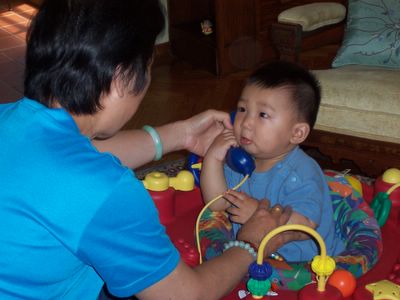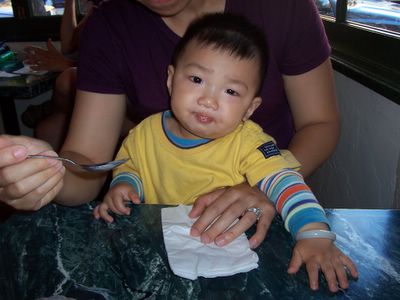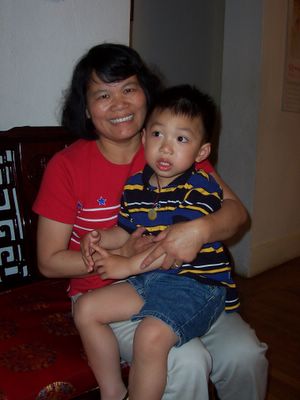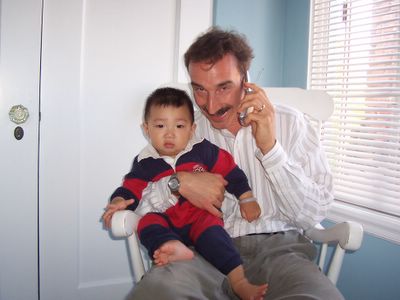Where Have You Gone, Joe DiMaggio?
James Chen: Asian-American writer, film director, journalist, entrepreneur, athlete, political activist, environmental activist and renaissance man
Saturday, July 30, 2005
What Jenny is Reading Now
After reading two books on North Korea, Jenny picked up "Why America Slept" on my recommendation. Many books have been written about the horror and tragedy of 9/11, but this book by Gerald Posner is the first one to provide a fully detailed account of the failures of the Clinton administration.

Gerald Posner's bestselling book on the events leading up to the September 11 terrorist attacks on the US was highly critical of the Clinton adminstration

Jenny was surprised to hear that Sudan actually offered to hand over Osama bin Laden to the US back in the mid-1990s, but Clinton and his advisors turned down the offer becaused they did not think he could be convicted in the US criminal court system. Just one one the many tidbits in this book that the mainstream media has effectively covered up because they make Clinton look bad.
I found that Author Posner is most effective in his efforts to "connect the dots", beginning with the first World Trade Center attack in 1993, just a month after Clinton took office. As the "United Way of terrorism", al Qaeda and a network of Muslim countries have been waging war on the West for nearly a decade before the September 11 attacks. In meticulous fashion, Posner masterfully shows the connections between the first World Trade Center bombing and all major terrorist attacks on US interests leading up to 9/11.
I suspect Jenny will be reading some of the other current events books on my shelf after finishing this one.
Wednesday, July 27, 2005
Beyond the Pale
The LA Times has an interesting feature article on Asians' preference for lighter skin, particularly for females. From "The Quest For A Whiter Shade of Pale":
For many Southern Californians, summer is the season for beaches, chaise longues and the quest for the perfect tan.The author hints at the cultural reasons for pale skin in Asian cultures. Later on, it is suggested that racism may be behind this ideal.
Not for Margaret Qiu. She and thousands of other Asian-American women are going to great lengths to avoid the sun--fighting to preserve or enhance their pale complexions with expensive creams, masks, gloves, professional face scrubs and medical procedures.
For them, a porcelain-like white face is the feminine ideal, reflecting a long-held belief that pale skin represents a comfortable life. They also believe it can hide physical imperfections
Whitening products have been a mainstay in Asia for decades, but cosmetics industry officials said they have emerged as a hot seller in the United States only in the past four years. Whitening products now rack up $10 million in sales a year, according to the market research firm Euromonitor.The real reason is less sinister sounding, and actually makes a lot of sense. Throughout Chinese history, the upper classes' privileged status meant that they had a lot of leisure time and could stay indoors during the hot daylight hours. Meanwhile, the lower classes would have to toil in fields to make a living, their darker skin signifying the work hours spent out in the sun.
But their popularity has sparked a debate among Asian-Americans about the politics of whitening. Qui and others say the quest for white skin is an Asian tradition. But others--younger, U.S.-born Asians--question whether the obsession with an ivory complexion has more to do with blending into white American culture, or even a subtle prejudice against those with darker skin.
Of course we now know about the harmful effects of too much exposure to sunlight from premature skin aging to cancer, which is mentioned in the story. But leave it to the guilt-ridden media to bring a racial angle to this age-old story.
Tuesday, July 26, 2005
Pictures of the Day
As you can probably tell, we haven't been doing much lately except going out to Tucker's to get ice cream and hanging out at home. At least the boys have been getting along lately.

Russell with his favorite ice cream: Tucker's Cookies and Cream


Punky says, "I can't reach the bath water. Can you help me?"


A shirtless Russell feeds Punky with gusto


Russell shows Punky the finer points of spinning tops

Sunday, July 24, 2005
Kristof: Christians Can't Help North Koreans, Only Liberals Can
Having just come back from a week-long visit to North Korea--where he was led around on a leash by his communist minders--Nick Kristof is shocked that Amercian liberals haven't taken the human rights situation in North Korea seriously. But most disturbing to Kristof is the fact that Christians (yeah, those crazy people that believe in Jesus Christ) have taken the lead in making the North Koreans' plight known to the rest of the world.
Don't be misled by Kristof's false praise of conservatives in his latest op-ed, "Where the Right is Right". That's just Kristof's baiting readers accustomed to his liberal ranting. Once again, Kristof takes a 180 degree turn somewhere in the middle of his op-ed and ends up blaming "Conservative Christians" for making the situation in North Korea even worse. It's kind of like blaming the United States for the gulags in the Soviet Union. Here is Kristof's lead:
Liberals took the lead in championing human rights abroad in the 1970's, while conservatives mocked the idea. But these days liberals should be embarrassed that it's the Christian Right that is taking the lead in spotlighting repression in North Korea.Kristof seems to have forgotten that Northern Korea was once a hotbed of Christianity. With the founding of the Democratic People's Republic of Korea (North Korea) in 1945, all vestiges of Christianity were annihilated with a ruthlessness unmatched in the history of communism. All churches were closed, known Christians shot, and the Bible banned and burned.
...
So can anything be done to help North Koreans? Yes, if liberals stop ceding the issue to conservative Christians. Ultimately, the solution to the nuclear standoff is the same as the solution to human rights abuses: dragging North Korea into the family of nations, as we did with Maoist China and Communist Vietnam.
Try as he might, Kim Il Sung was never able to eliminate Christian thoughts from the minds of his people. North Korean defectors report that underground Christian Churches are alive and well, providing the starving people with a glimmer of hope for deliverance from the Kim regime. Many escapees from North Korea are Christians, and they are believed to be at the center of a growing resistance movement against the communist regime.
Accordlingly, Christians are specifically targeted for persecution by the North Korea government. Just owning a Bible will get one sent to a concentration camp, and preaching Christianity will usually result in the death penalty. Thus, we should not be surprised that Christians are at the forefront of the North Korean liberation movement. They are merely helping their own, and yet this is baffling to the Harvard-educated Kristof
After his initial slap at Christians, Kristof throws up a smokescreen of alleged conservative policies, of which I have never heard:
The problem with the conservatives' approach is that it's great at calling attention to the issues, but some of its methods are flawed and counterproductive. There's talk, for example, of proposing a 25 percent tariff on Chinese goods unless China protects Korean refugees - but a tariff wouldn't help Koreans and would undermine the world economy. Likewise, a campaign by well-meaning activists to help North Korean refugees in China has so far only set off a Chinese crackdown that forced some 100,000 refugees back to North Korea. The conservative approach has generally been a mix of fulmination and isolation, which hurts ordinary Koreans, amplifies Korean nationalism and cements the Dear Leader in place.Kristof's rant contains no concrete specifics, and is utterly meaningless. I've never heard of this 25% tariff on Chinese goods, and somehow he blames the Christians for getting refugees sent back to North Korea. I read every bit of information coming out of the region about North Korea, and I've never heard of this alleged tariff proposal or the Chinese "crackdown" being caused by Christian activists. Googling these terms yields absolutely nothing.
Not surprisingly, he completely ignores the Christians' greatest accomplishment: the creation of an underground railroad in East Asia that has allowed thousands of North Korean refugees to hide from the authorities and brought hundreds of them to the West. There's plenty of documentation about these brave people helping the North Korean refugees. You can read about their efforts in this article in the National Review, which includes links to these Christian groups. Googling this issue will also yield hundreds of valuable links on the work of these Christians.
Kristof lists some of the deprivities of the current North Korean government, and then suggests that they can change if we engage in dialogue and trade with them. Actually, we've been talking with these wackos for 50 years, and they're not going to change. As long as Kim Jong-Il is in power, there's absolutely no reason to believe that this thug will turn another leaf.
The rest of Kristof's column consists falsehoods and pathetic liberal mush. For instance:
"Free markets are popping up." - For all the hoopla surrounding these "free markets", they are absolutely tiny when considering that North Korea has 23 million citizens, and very few of them can actually afford the high prices the merchants charge. Some merchants have been seen selling the donated food aid given to North Korea by the US and South Korea. One Free Korea has an excellent report on one such market here.
"Two tightly controlled Internet cafes have opened." - That's right: two internet cafes in the entire country. I think Kristof's grasping at straws here.
"Cellphones have been introduced, with restrictions." - The few cell phones in North Korea belong to high-ranking government officials. Privately-owned cell phones were recently banned because of suspicions that they were linked to an assasination attempt on dictator Kim Jong-Il.
"Plans are under way for a new Orthodox church." - That's right: one new church in a country of 23 million people. There are currently three (3) official state-approved churches in all of North Korea.
Two internet cafes and a new church. I guess Kristof is looking at the bright side of things, however dim. For a clearer perspective, Kristof should read Barbara Demick's latest reports on North Korea in the LA Times. Her dispatches show a decaying economic infrastructure and a society on the verge of collapse. Evidently, she did not go on the same tour group as Nick Kristof.
Wednesday, July 20, 2005
A Must Read at American Thinker
I recently submitted a commentary piece to the American Thinker, an online journal along the lines of the Atlantic magazine, and the editor agreed to publish it. Check out "A Tale of Two Columnists". As a teaser, here's the first paragraph:
I can't think of any two papers more different in their approach to news as the New York Times and the Wall Street Journal. Likewise, I can't think of any two reporters more different in their views of the North Korean situation as Nicholas Kristof and Kang Chol-hwan. Both newspapers recently published editorials on the growing problem of North Korea, Kristof in the New York Times and Kang as a guest columnist in the Wall Street Journal. It might help to look at their backgrounds before comparing their viewpoints.Let me know what you think.
Where's Russell?
On Monday, Jenny dropped off Russell at her sister Sharon's house in San Jose where he will be staying until Friday. You see, Russell has off from pre-school this week, so Jenny got the bright idea of having her mother take care of him. I was initially against this because I thought Russell would freak out and that I would miss him. It turns out that he loves hanging out with his grandma and cousin Andrew. He gets to eat Kentucky Fried Chicken, watch Elmo videos and ride bicycles all day. Jenny's mom says that Russell and Andrew are best buddies now.

Russell and me in happier days before we shipped him to San Jose for the week

Things in the house have been very calm without Russell. I still miss him though.
Monday, July 18, 2005
Signs of Life on Mt. Olympus
I recently sent the following note to the New York Times Editorial Board:
Folks,
Some day, it would be nice to see an Asian face on your Editorial Board and among your regular Op-Ed contributors. Perhaps someone whose family fled China, Korea, Vietnam, Cambodia or Laos. Or maybe even an Indian-American. Whatever the nationality, it is plainly obvious that Asian-Americans have achieved much in business and in public life, yet they cannot seem to break into the media (except for the parade of pleasant-looking Asian females on television news).
It is about time that you practice what you preach.
Sincerely,
James Chen
Alameda, CA
To my utter amazement this morning, I received this response from Editorial Page Editor Gail Collins:
Dear Mr. Chen,
We have incredible Asian-American journalists at the Times, working both as reporters and editors.
While it's true we don't have any Asian-Americans on the board currently, our former Op-Ed editor, Terry Tang, was Chinese-American. She also served on the editorial board and is now an editor on the business desk, specializing in technology. We also have many contributors to the op-ed page whose roots are in Asia.
Best wishes,
Gail Collins
The current Editorial Board has 14 members, of which--to my untrained eyes--12 are white (6 women) and 2 are black (1 woman). Collins names one token Asian no longer on the board--Terry Tang--and throws out the bone of allowing other Asians to contribute to the Op-Ed page as guests.
In other words, not in your lifetime, bud.
Sigh.
Happy Birthday, Freddy the Fireman
On Saturday, we were invited to Freddy the Fireman's birthday party up at his Marin County retreat. Since Jenny's mom was over for the weekend, we made the decision to leave the kids at home and go to the party childless. It was the first time we have ever left the house together without Russell and Punky, and boy did it feel weird. But it was great to be able to mingle with the birthday crowd without having to worry about changing diapers, or following a little one around the house.
As with all parties hosted by Sharone and Freddy, the food, atmosphere and people were great. I stuffed my face with all the dishes you see below, plus items fresh off the grill and out of the oven. In between bites, I met a interesting group of people, many of them who I had never met before, and many of them SF-based firemen. Freddy's two sons were there, too.
We ended up leaving the party after only a couple of hours. Jenny couldn't resist calling home and asking her mother how the kids were doing. While Russell didn't care that we were gone, it turns out that Punky was crawling around the house looking for us. Jenny's mom said he had the pouting lower lip look during that time. And so we went home.

Freddy the Fireman and sons Dom (left) and Fred, Jr.


Just a small sample of Freddy's Birthday feast

Sunday, July 17, 2005
Why We Love Alameda, Part 1
We've only been living in Alameda for a little over a year now, but I can tell that we're never going to move again. Everything about Alameda rocks. This weekend, for instance, was a scorcher, weather-wise, throughout the Bay Area. But in Alameda, the thermometer was a good 10-15 degrees cooler than in Oakland, just across Route 880. We've all been sleeping well at night, thanks to the cool breezes that come off the water that surrounds the island. So there's no need for air conditioning at home, which makes smile whenever I see the electricity bill.
Tonight, we walked over to the Kamakura Restaurant for dinner with Jenny's mom, oldest and youngest sisters, and their families. Jenny swears its the best Japanese restaurant in the Bay Area. Even Russell went wild and had sushi (salmon). It's the vibes, I tell ya. Russell and Punky are going to love growing up here.

I'm Punky Brewster, who are you?


Russell answers the door at the Ray Guy house


Punky chooses Scoop over Nascar


Russell picks a peck of pickled peppers

What Ever Happened to John Deutch?
When we last heard from former CIA Director John Deutch back in 2000, he had been reprimanded by the Agency for keeping thousands of highly classified intelligence documents on his home computer in violation of government security rules. Confronted with this security lapse and the fact that his computer contained pornography downloaded from the internet, Deutch’s response was to erase the contents of his hard drive in a clumsy cover-up attempt. He was later pardoned by President Clinton on the last day of his presidency.
Now a professor of chemistry at MIT, Deutch recently appeared as a Op-Ed contributor in the New York Times. In an editorial titled "Time to Pull Out. And Not Just From Iraq", Deutch argues that the United States should pull its military forces completely out of Iraq, and eventually, the Middle East. First, Deutch provides us with the appropriate context:
American foreign policy should be guided by two general principles: the first is advancing our security and political interests; the second is encouraging prosperity and responsive government for all people. It may be that with our encouragement and example, many countries will choose to adopt democracy and a market economy, presumably adapted to their own culture. Of course, others will follow a very different road for some time, perhaps indefinitely, as ethnic differences, poverty and historical and religious traditions affect and constrain choices.There is a general reluctance among liberals to say that one culture is superior to another, particularly in its adaptability toward democratic principles. However, what Deutch is trying to say, in a racially-sensitive manner, is that the US not likely to succeed in imposing democracy on countries in the Middle East because of "cultural differences". Never mind that successful free elections were held in Iraq and Afghanistan in the past year, and millions of joyous Iraqis and Afghanis voted in spite of terrorist death threats, holding their ink-stained fingers up in triumph. America has a long and honorable tradition of establishing democratic governments with military forces on the ground in countries once thought hostile to democracy—just ask Germany, Italy and Japan.
America embarks on an especially perilous course, however, when it actively attempts to establish a government based on our values in another part of the world. It is one matter to adopt a foreign policy that encourages democratic values; it is quite another to believe it just or practical to achieve such results on the ground with military forces. This is true whether we are acting alone, as is largely the case in Iraq, or as part of an international coalition.
It seems that many in the Bush administration believed that an invasion to topple Saddam Hussein would result in a near spontaneous conversion of Iraq, and with luck much of the Middle East, to democracy. But the notion of intervening in foreign countries to build a society of our preference is not just a Republican or conservative failing. The corresponding Democratic or liberal failing is the view that America has a duty to intervene in foreign countries that egregiously violate human rights and a responsibility to oppose and, where possible, remove totalitarian heads of state. This Democratic rhetoric quickly moves from "peacekeeping" in a country torn by strife to "peacemaking" and to "nation-building."
Instead, Deutch favors the diplomatic approach towards bringing peace to the Middle East region, bolstered with economic incentives. He provides some examples:
If we want to influence the behavior of nations, we would be better served by combining diplomacy with our considerable economic strength. Even North Korea saw the advantages, for a period of time, of constraining (albeit selectively and temporarily) its nuclear weapons activities for the economic benefits that accompanied the "agreed framework" of 1994. More recently, Libya backed off its secret pursuit of weapons of mass destruction, apparently on the sole expectation of economic benefit. The demise of the apartheid regime in South Africa after an embargo showed what sometimes can be done by collective economic action.It is fitting that Deutch chooses North Korea as his first example. There is perhaps no better illustration of the failure of combining diplomacy with economic aid (i.e. bribery) than North Korea. Claims that the Clinton-negotiated "Agreed Framework" Treaty prevented the North Koreans from developing nuclear weapons are utterly false. The North Koreans themselves have admitted that they cheated on the agreement by secretly pursuing a uranium enrichment program ("selectively"), and now they boast of having recently manufactured several plutonium-based bombs to serve as a deterrent to US attack ("temporarily").
Equally as puzzling is his citing of Libya’s recent dismantling of its nuclear weapons program "on the sole expectation of economic benefit". Libyan dictator Moammar Gaddafi began the process of negotiating an end to these programs just days before the start of the US invasion of Iraq, and finally capitulated to US & British demands within 5 days of Saddam Hussein’s capture by US forces. A coincidence? I think not. I would believe that watching a dirty, disheveled Hussein getting pulled out of a "spider hole" by US troops in December 2003–as well as the invasion of Iraq itself–did much in convincing Gaddafi to surrender his nuclear booty.
Certainly, we have come to expect a fair amount of revisionism coming from the pages of the New York Times. That Clinton-appointee Deutch in a 1,200 word piece on the Middle East would fail to mention "al Qaeda", "Osama Bin Laden"or even "Afghanistan" is also not at all surprising, for it was largely under President Clinton that al Qaeda was allowed to flourish in Afghanistan during the 1990s, setting the stage for the climatic terrorist attacks of September 11, 2001.
But even more troubling than rewriting history and cultural bias is Deutch’s conclusion that Iraq is a lost cause:
I do not believe that we are making progress on any of our key objectives in Iraq. There may be days when security seems somewhat improved or when the Iraqi government appears to be functioning better, but the underlying destabilizing effect of the insurgency is undiminished. When, after the fall of Baghdad, the decision was taken to disband the Iraqi Army, an impossible security situation was created: a combination of hostile ethnic factions supported by demobilized, but armed, military and security units with surrounding nations actively supporting them.Deutch’s myopic view of the Iraq situation typifies the pre-9/11 thinking pervading through much of today’s Democratic Party, and completely ignores the lessons learned from American inaction against terrorism throughout the 1980s and 1990s. A quick retreat from Iraq as proposed by Deutch would surely be perceived as a sign of American weakness, and invite further attacks by terrorists on US interests throughout the world. Indeed, Osama bin Laden himself repeatedly cited American withdrawals from Lebanon (1983) and Somalia (1993) in speeches and interviews leading up to his 1998 "Fatwa Against All Jews and Crusaders"--the al Qaeda declaration of war on the United States.
The insurgency cannot be overcome easily by either United States military forces or immature Iraqi security forces. Nor would the situation be eased even if, improbably, the United Nations, NATO, our European allies and Japan choose to become seriously involved.
Our best strategy now is a prompt withdrawal plan consisting of clearly defined political, military and economic elements. Politically, the United States should declare its intention to remove its troops and urge the Iraqi government and its neighbors to recognize the common regional interest in allowing Iraq to evolve peacefully and without external intervention. The first Iraqi election under the permanent constitution, planned for Dec. 15, is an appropriate date for beginning the pullout.
The ironies abound in having Deutch lecture New York Times readers on US policy relating to terrorism and Middle East. The breakdown in intelligence leading up to the September 11 attacks and the 2003 Invasion of Iraq are very familiar topics to Professor Deutch, who served as Deputy Secretary of Defense from 1994 to 1995 and Director of the Central Intelligence Agency from 1995 to 1996. But in spite of this, the New York Times continues to serve up Op-Eds from Clinton administration retreads and apologists, believing that absent-minded readers will forget about ineffective missile attacks on Sudanese pharmaceutical factories and Afghan terrorist encampments, and billions in aid given to the Palestinians and Arab governments–all prior to 9/11.
Perhaps the Times can keep the ball rolling by having Sandy Berger review the finer points of handling classified documents, or allowing Janet Reno to examine the Bush administration’s hostage negotiation tactics in its Op-Ed pages. But given their current slate of Op-Ed columnists, that may not be necessary.
Monday, July 11, 2005
(Wish I Could Fly Like) Superman (Kristof)
When mild-mannered NY Times reporter Nick Kristof isn't flying around to exotic locales like Cambodia (where he attempted to save two Asian damsels in distress), Sudan (where he attempted to save an entire African nation) or North Korea (where he will attempt to save an entire region by negotiating nuclear disarmament on the personal invitation of Kim Jong-Il), he can usually be found in the Blue States pushing the leftist domestic agenda. This week finds our Superman-like hero Kristof taking up the sensitive topic of physician-assisted suicide in the liberal haven of Portland, Oregon.
As with every leftist afflicted with Bush Derangement Syndrome, Kristof can't help himself in blaming Bush for everything that is wrong with the world. In comic book-speak, George Bush is Lex Luthor to Kristof's Clark Kent. According to reporter Kristof, President Bush is the obstacle to one Jack Newbold from dying with dignity--at least in Kristof's superhero eyes. [Sometimes, I wonder if Kristof thinks he has x-ray vision, just like Superman.]
But Kristof neglects to tell his readers that the Supreme Court has already ruled on physican-assisted suicide and the so-called "right-to-die". In Washington v. Glucksberg (1997), the Supreme Court ruled that there is no constitutional right to commit suicide and that allowing physicans to prescribe lethal doses of drugs would lead us towards the "slippery slope" of euthanasia.Jack Newbold is a 59-year-old retired tugboat captain who is dying of bone cancer. It's one of the most painful cancers, and he doesn't want to put his wife and 17-year-old daughter through the trauma of caring for him as he loses control over his body. So Mr. Newbold faces a wrenching choice in the coming weeks: should he fight the cancer until his last breath, or should he take a glass of a barbiturate solution prescribed by a doctor and put himself to sleep forever? He's leaning toward the latter.
"I've got less than six months to live," he said. "I don't want to linger and put my wife and family through this."
I don't know what I would do if I were Mr. Newbold, nor if I were his wife or daughter (they're both supporting him in any decision he makes). But I do believe that it should be their decision - not President Bush's. Unfortunately, Mr. Bush is fighting to overturn the Oregon Death With Dignity law, which gives Mr. Newbold the option of hastening his death. Oregon voters twice passed referendums approving the law, which has been used since 1998, and it has wide support in the state. The Bush administration issued an order that any doctor who issued a prescription under the state law would be prosecuted under federal law. Oregon won an injunction against the order, John Ashcroft lost an appeal, and now the Supreme Court will hear arguments in the fall.
In concurring with the majority, Justice O'Connor wrote:
In sum, there is no need to address the question whether suffering patients have a constitutionally cognizable interest in obtaining relief from the suffering that they may experience in the last days of their lives. There is no dispute that dying patients in Washington and New York can obtain palliative care, even when doing so would hasten their deaths. The difficulty in defining terminal illness and the risk that a dying patient's request for assistance in ending his or her life might not be truly voluntary justifies the prohibitions on assisted suicide we uphold here.And by the way, the Supreme Court voted unanimously (9-0) to uphold existing the statutes to preserve life and outlaw physician-assisted suicide. A unanimous decision--that's every Supreme Court justice from Ginsburg to Scalia. How often do we see such broad consensus on the Supreme Court?
I am very sympathetic to Mr. Newbold's situation, with my own father having recently undergone lung cancer surgery, and the death of my father-in-law from stomach cancer just months earlier. But I believe that if someone wants to self-destruct, they should do it themselves and leave the medical profession out of it. Kristof also seems to have forgotten that the physicians have taken an oath that says they should "do no harm" to their patients.
Finally, it wouldn't a Kristof opinion piece without a parting shot at President Bush.
When patients use the law, they typically set a date and gather family and friends around them. Those who have witnessed such a parting say it's not as morbid as it may sound. "It's pretty weird knowing what day you're going to die, but we could plan for it," said Julie McMurchie, whose mother used the barbiturates about a week before she was expected to die naturally of lung cancer. "Two of my siblings lived out of state, and they were able to come, so we were all present. ... We were all there to hug and kiss her and tell her we loved her, and she had some poetry she wanted read to her, and it was all loving and peaceful.Presumably, Nick Kristof has plenty of time and a large in-house research staff at the Times to help him prepare his twice-weekly opinion pieces, for which he is compensated handsomely and given an enormous travel budget to explore each issue first-hand. Despite the huge resources at his disposal, Kristof usually neglects to tell his readers the complete story--very unbecoming for a Superman-wannabe. In this case, he has declined to inform his readers that the Bush Department of Justice is merely obeying a Supreme Court ruling made during the Clinton Administration. But then, Kristof wouldn't have much to write about as he plays Superman dashing around the world to save civilization.
"I can't imagine why anybody would begrudge us that opportunity to say goodbye, and her that opportunity to have peace."
The same applies to Jack Newbold and everyone in his position. Mr. Newbold faces an excruciating choice in the coming weeks, and he's got enough on his mind without the White House second-guessing him.
Back off, Mr. Bush.
Quick, someone toss me the kryptonite while Kristof's still on the West Coast.
UPDATE - Reader Rob (who is a lawyer) has kindly reminded me that the Justice Department's argument in Gonzales v. Oregon is based on the interpretation of the Controlled Substances Act, and whether or not the dispensing and use of prescription drugs to commit suicide serves a "legitimate medical purpose". There is a nice summary at Duke Law School's website here.
A group called Not Dead Yet has filed an Amicus Brief in support of the Justice Department, citing Washington v. Glucksberg, the Controlled Substances Act and the Americans with Disabilities Act. It's a great document, and wish I had read it before posting my original text.
A Sunday to Remember
We spent a typical Sunday at home most of the day, with a brief excursion into Chinatown for lunch. While I occupied the kids with Play Doh and the Superman game (picking up Punky and Russell and making them "fly" around the house), Jenny finished painting the basement and the repaired plaster around the house. She also picked vegetables from the victory garden.
Later that evening, we visited Russell's old teacher, Teacher Liu, from Starlite School. She happens to live close by in Alameda. On the way home, we stopped for ice cream at Tucker's. The overdose of sugar may have contributed to Russell's hyperactivity tonight. He did not go to sleep until nearly 1AM.

Punky enjoys ice cream at Tucker's in Alameda


Russell pays a visit to Teacher Liu from the Starlite School


Celebrating the harvest from the Victory Garden

Sunday, July 10, 2005
My Dinner with Dan
Socially, this was one of the busiest weekends of the year for us. Yesterday, my hometown friend Dan the Man stopped by for dinner. He happened to be in the area for a business trip. It was the first time since our wedding five years ago that we've seen Dan the Man.
As you can see from the photos below, Russell got along well with Dan the Man. At dinner, he plopped himself into Dan's lap as he would with me or Jenny.

After making peace with Dan the Man, Russell settles down for dinner


Russell threatens Dan the Man with a knife

Dinner was delicious. The roast chicken came out moist and tender, and the Vegatables Tian dish was amazing. After dinner, Jenny's friends Christine and Derek stopped by and we had tea and japanese rice cakes from Kamakura restaurant. Dan the Man went back to his hotel room that night on a full stomach.

Lemon Chicken with Croutons


Vegetable Tian with zucchini and tomatoes from the victory garden

Dinner took Jenny longer than usual to prepare, so Dan the Man and I spent the time playing with the kids and catching up with each other. There was a lot to cover. Dan works in electronic publishing for a major international media and consumer electronics company, so we discussed blogging at length. We also spoke of politics and family, and of my California experience to date. We'll be seeing Dan when we head out to New Jersey next month.

Before dinner, Dan the Man makes the connection while getting to know Punky

Saturday, July 09, 2005
Happy Birthday Frank, Hi Nancy
On Friday night we were invited to my friend Frank's 41st birthday party. Frank and his wife Diana recently moved to their new house way up in the Oakland hills. Nearly all of the attendees were connected to his law school days at Berkeley. Since I was also at Berkeley at the same time--but studying engineering at the graduate school--I also got to know many of Frank's inner circle. They are a diverse and interesting bunch of people.
There nearly as many young children as adults at the party, which made for a lively atmosphere. Russell and Punky got along well with the other kids and (surprisingly) the two dogs at the party. Unfortunately, I forgot to bring my camera to the party. Next time, I won't forget.
Earlier today, Jenny's cousin Nancy and her two boys dropped by for lunch. Both Jenny and Nancy are stay-at-home moms and are bored to death with their current lifestyle. I'm guessing that both Jenny and Nancy will be going back to work in another year or two. We need the extra money more than Nancy does, but she's stayed at home much longer than Jenny has.
Thursday, July 07, 2005
Why My Money and Kids Won't Be Going to Cornell
I'm a 1986 graduate of Cornell University's School of Engineering, and this really pisses me off:

Grade inflation at Cornell

"In 1997 Cornell University began posting median grades for every course online, so that students could put their own grades in a larger perspective. (After all, an A in "Physics for Poets" is presumably less impressive than an A in "Physics for Physicists.") The university's theory—which reveals an astonishing naiveté about human nature—was that this would encourage students to choose more-challenging courses. Instead, according to a paper published early this year by two Cornell economists, the policy provided a case study in how to pump up GPAs."
"Armed with accurate, official grading information, students used it to pick easy classes and avoid difficult ones: once-hidden guts were now readily identified, enrollment in them ballooned, and since the new policy was instituted the overall rate of grade inflation—already a subject of concern at Cornell, as in the academic world in general—has more than doubled."
Source: the Atlantic Magazine





